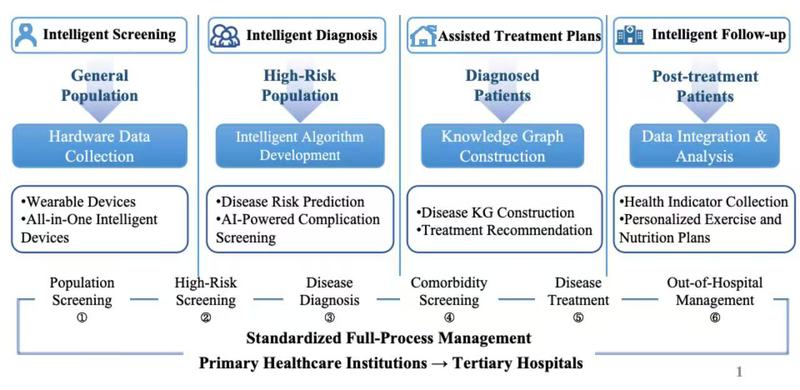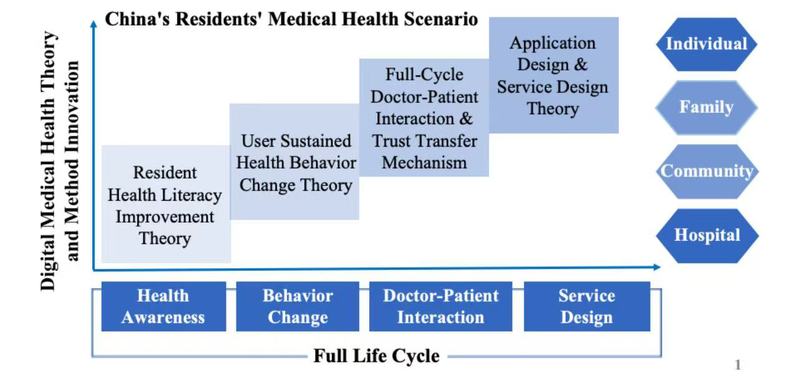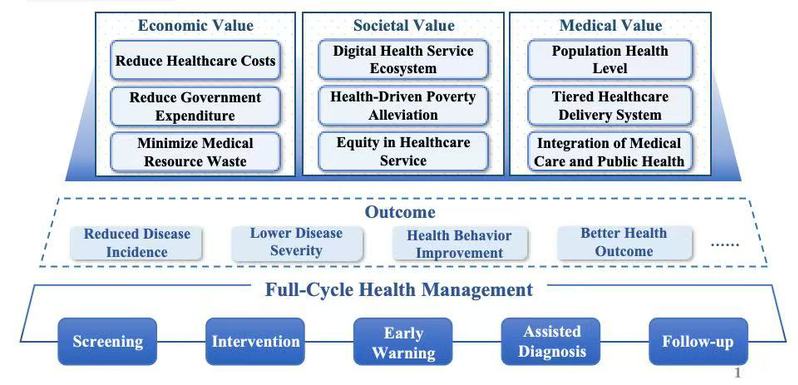eHealth Research Institute Research Directions
The development of digital health has become an important trend in addressing global medical and health issues such as aging population and chronic disease management. It is also a cutting-edge hot topic in the field of management science internationally. The growing demand for healthcare management driven by China's aging population and the surge in chronic disease patients, coupled with policies such as the Healthy China Strategy and the rapid development of digital health technologies, presents significant opportunities for establishing and improving a universal health system through the development of digital health. However, current digital health research faces the following urgent scientific challenges: ①Given the complex characteristics of healthcare big data, such as multi-source, multi-modal, and time-series data, how to innovate data management methods and technologies and promote the integration with health services to achieve precise auxiliary diagnosis and treatment, disease risk prediction, and personalized health management? ②Given the increasingly complex healthcare service environment, the impact of emerging information technologies on universal health management remains unclear. How to expand digital health management theories and methods based on China's healthcare landscape? ③ How to achieve a dynamic integration of digital health theories, methods and practical scenarios, and build a medical and health service system that covers all people, all life cycles and all scenarios to meet the health needs of the entire population? To address the above-mentioned scientific issues, the E-Health Institute, focusing on the current state of the current status of digital health development in China, has conducted extensive research by integrating multi-disciplinary theoretical methods and multiple application scenarios, mainly covering the following directions:
Research direction 1: Digital Precision Healthcare
Digital precision health is an emerging approach based on individualized genes, environment, lifestyle and other factors to provide disease treatment plans and prevention strategies, it helps residents in managing health and disease prevention. High-risk disease warning and disease risk prediction, intelligent disease diagnosis, personalized health recommendations, intelligent chronic disease health management, etc. are the main entry points for future research in the field of digital precision health. This direction intends to be based on multi-source health data (including electronic medical records, medical images, medical signals and other data), apply data mining, image recognition, natural language processing and other technologies, use of empirical research and mathematical modeling methods, focusing on the profound impact of new technologies and new applications such as artificial intelligence on disease prevention, diagnosis, treatment, health management and other aspects, and promote the application in clinical and chronic disease management.
Specific research directions include:
- Intelligent health screening for community residents
- AI-based intelligent early warning and assessment of chronic diseases
- Assisted diagnosis and treatment based on multimodal medical knowledge graphs
- Intelligent rehabilitation follow-up plans based on medical knowledge graphs
- Personalized diet and exercise recommendations based on knowledge graph

Figure 1 Digital Precision Health
Research direction 2: Digital Healthcare Theories and Methods
Digital health is driven by data as a core element and propelled by emerging information technologies such as artificial intelligence, big data, and cloud computing, fostering transformations and innovations in health management models. Within the context of building a “Healthy China” and “Digital China,” a key issue is whether health management can effectively embrace digitalization, accelerate system construction, and enhance digital capabilities and service levels. This research area explores digital health theories and methods under the influence of emerging technologies. It applies interdisciplinary approaches from computer science, management, econometrics, sociology, and design science. The research aims to refine and innovate existing health theories and methods from perspectives including cognition (health literacy), behaviour (sustained health behaviour change), doctor–patient interaction (trust transfer mechanisms), and service design (personalized service design).
Specific research directions include:
- Comprehensive, lifecycle, and holistic models of digital health management
- Human–computer interaction and collaborative decision-making
- Coordination and management of healthcare service processes
- Mechanisms of sustainable value creation in digital health

Figure 2 eHealth Service
Research direction 3: Population Healthcare System and Social Welfare
In recent years, to advance the Healthy China strategy of “universal health through shared development,” China has introduced a series of policies supporting digital health and building a population health system tailored to national conditions. This research area closely monitors emerging information technologies and recent health policies, using methods such as data mining and machine learning in combination with economic research paradigms. It investigates the impacts of relevant policies and technologies in areas such as healthcare services and health education, providing both theoretical and practical guidance for improving the Healthy China policy framework.
Specific research directions include:
- Proactive health management systems for residents
- Digitalized healthcare service ecosystems
- Optimization of healthcare resource allocation across “family–community–hospital” scenarios
- Policy impact evaluation for healthcare and health management

Figure 3 Population Healthcare System and Social Welfare